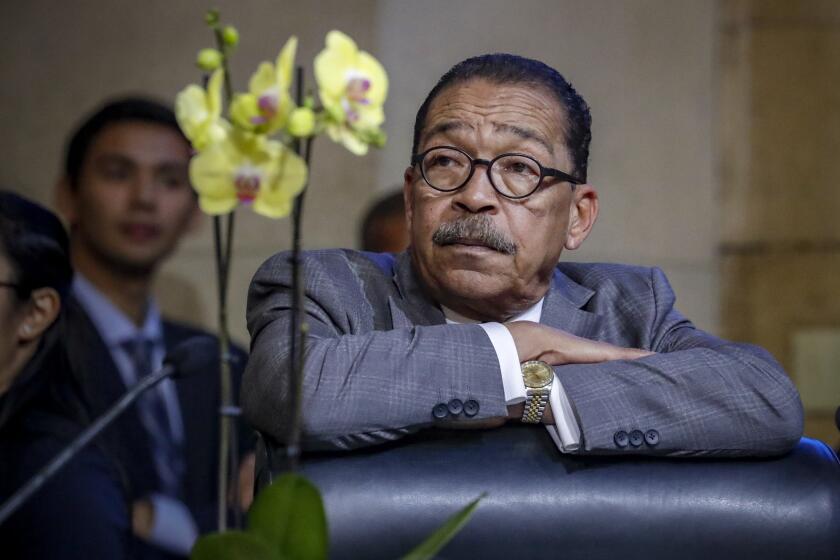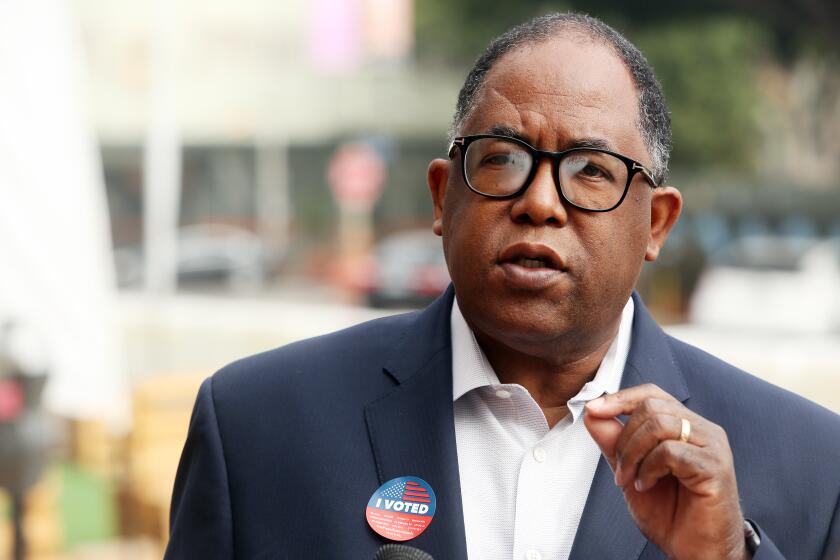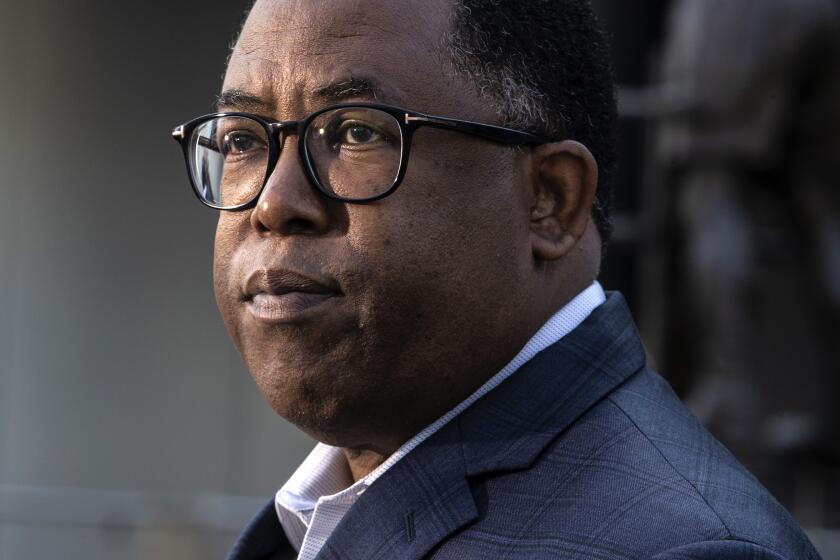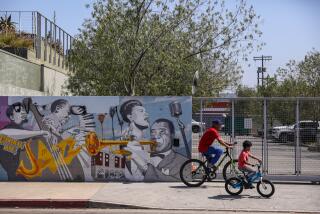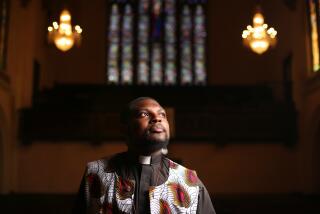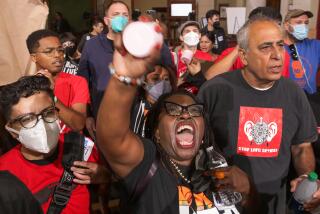Column: How the fight over a City Council seat is tearing apart Black Los Angeles
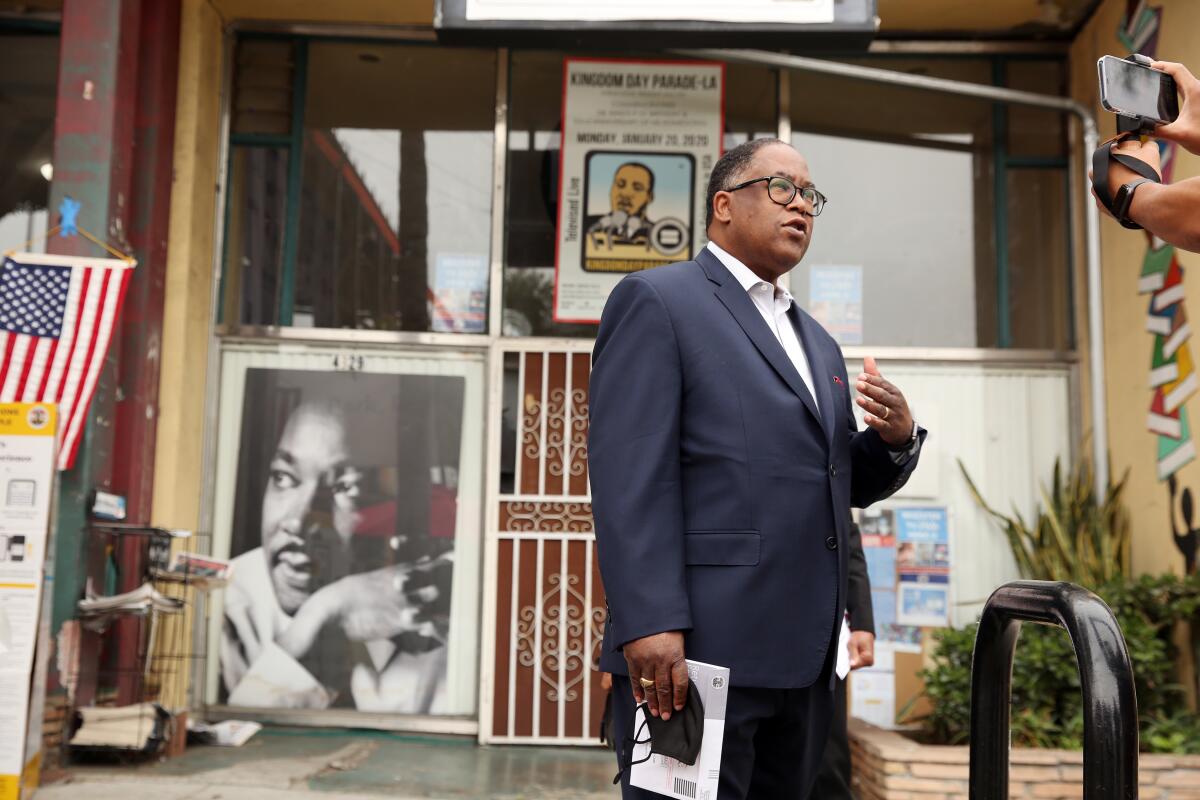
- Share via
As a community advocate, Joe Delgado has learned to expect dysfunction from the city of Los Angeles.
For months, he and others with the Alliance of Californians for Community Empowerment have been trying to get help for hundreds of Black and Latino tenants living in slum-like conditions at the Chesapeake Apartments, a sprawling complex in the heart of the L.A. City Council’s 10th District.
“They’ve identified potentially 160 units that have lead exposure where kids are living,” Delgado told me. “And there has not been any action taken to come and do blood testing to make sure these kids don’t have permanent brain damage.”
But, as difficult as it has been for him to get the city to act, chances are, it’s about to get a lot worse.
On Tuesday, an L.A. County Superior Court judge ruled that Herb Wesson, the termed-out councilman who has been representing the 10th District on an interim basis, can no longer perform “any functions” of the job. For now anyway.
A Judge has temporarily barred Herb Wesson from performing duties as Mark Ridley-Thomas’ appointed replacement on the L.A. City Council.
It’s just the latest plot twist in an unfortunate political drama that has been playing out since October, when Councilman Mark Ridley-Thomas was indicted on federal bribery charges and then suspended from the City Council.
Wesson has been serving in his stead since March.
But now, he too is barred from voting, from meeting with constituents and from introducing proposed ordinances.
And that means, once again, the tenants of the Chesapeake Apartments — along with hundreds of thousands of other residents in the 10th District neighborhoods spanning South L.A. and Mid-City — have lost a desperately needed point person on the City Council.
“They’re already living in s— conditions,” Delgado lamented. “And then when they organize a solution, they hit barriers like this from the city, which should be doing the complete opposite and focusing on how to expedite what they need.”
Indeed, even by L.A.’s reputation for dysfunctional politics, this is bad. There’s plenty of blame to go around for it too.
Ultimately, though, it’s City Council President Nury Martinez who decided to make a bad situation worse in the 10th District, leading to infighting in the Black community, in particular.
She was the one who opened the door to Tuesday’s ruling by appointing Wesson to represent the district in the first place. And the rest of the City Council then walked through that door by approving him with a unanimous vote.
Therefore, Martinez bears most of the responsibility for what has gone wrong since then and also has a responsibility to help make it right.
Many are rising to defend and pray for the councilman, while calls escalate for him to step down or, at the very least lose, his committee assignments.
Because picking Wesson, even on a temporary basis, even with support from voters in South L.A., was always a legally dubious decision. He had already served the three full terms on City Council, the maximum allowed under the City Charter, and it was questionable whether he could return.
And so, unsurprisingly, Ridley-Thomas’ allies, including the Southern Christian Leadership Conference of Southern California and several 10th District constituents, quickly filed a lawsuit challenging Wesson’s appointment.
And then, also unsurprisingly, Superior Court Judge Mary H. Strobel sided with the plaintiffs Tuesday, saying they were likely to prove Wesson couldn’t return to the City Council because he is termed out.
In response, Martinez griped that it was “wrong that a group of individuals with suspect agendas are working to keep over 250,000 residents from having representation on this council.”
Perhaps.
Or perhaps she could’ve just prioritized the needs of the 10th District’s residents, many of whom were still dealing with the fallout from Ridley-Thomas’ unexpected indictment and suspension.
Martinez could’ve appointed someone from his staff, making it easier to continue constituent services, such as with tenants of the Chesapeake Apartments. Or appointed someone more likely to have a good relationship with the county, given that Wesson lost his last bid for office to Supervisor Holly Mitchell.
At the very least, she could’ve appointed someone who wouldn’t have drawn an immediate lawsuit.
In fact, Martinez still can do any and all of these things.
Strobel, in her ruling, made clear that she would be fine with someone being appointed to be a voting representative of the district. It just can’t be Wesson.
On Wednesday, Martinez appointed Wesson’s chief of staff, Heather Hutt, to be its nonvoting caretaker.
“My clients have no problem with appointing someone as a temporary representative,” John Sweeney, the attorney for the SCLC of Southern California, told me Wednesday. “They just want a voice in the process.”
::
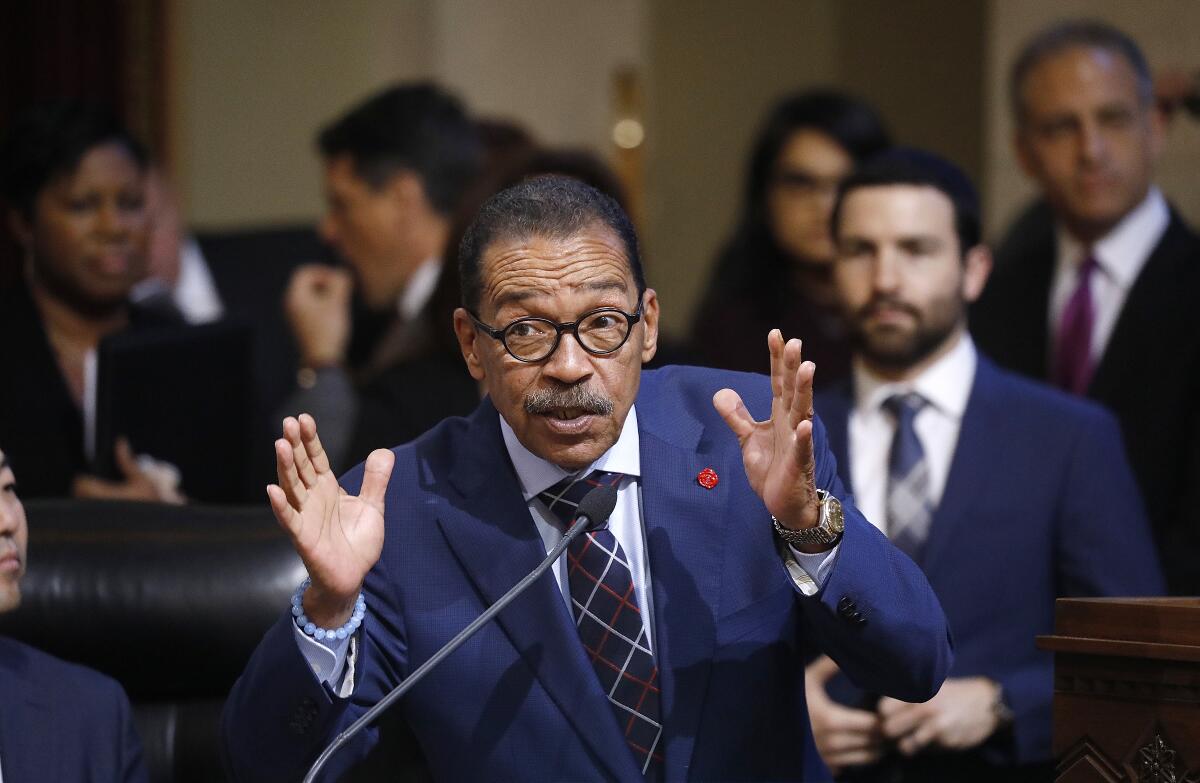
Meanwhile, the damage to the 10th District has been done, especially in South L.A.
Gina Fields, president of the McClung Bronson Block Club in Leimert Park, said she has watched as the political class of Black Los Angeles has divided into two camps: Wesson supporters and Ridley-Thomas supporters.
Both men have deep legacies in the community. Wesson was the first Black president of the City Council, and Ridley-Thomas is, as Earl Ofari Hutchinson, president of the Los Angeles Urban Policy Roundtable, put it, a “one-man institution in Black politics.”
Many voters and stakeholders told me they feel caught in the middle. They respect both men and don’t want to pick or make either one an enemy.
“It’s tearing us apart. This is not what any of us wanted,” Fields told me. “It’s not that these two men are both fighting for their political careers. It’s that they’ve been put in this position where they have to do this.”
For months, allies of Ridley-Thomas have been advocating for him, reminding anyone who will listen that he has denied the federal charges he’s facing and, therefore, deserves to have his seat back on the City Council.
The SCLC of Southern California, of which Ridley-Thomas was executive director in the 1980s, set the tone early on. Just weeks after the indictment and suspension, the civil rights group held a screening of “Selma,” followed by a panel discussion about the disenfranchisement of Black voters in the 10th District.
“If you don’t like that you don’t have a voice now, if you don’t like that they are trying to sequester and trying to omit, and trying to oppress and trying to keep our voices down by getting our elected leader out of the way, then you need to say something!” Pastor William D. Smart Jr. told those who came to watch.
Without a voting member on the L.A. City Council, residents in the 10th District are voiceless in local government. Some insist it’s voter suppression.
There also have been protests, including one outside L.A. City Hall that was attended by civil rights leaders, including Martin Luther King Jr. contemporary the Rev. James Lawson Jr. And earlier this year, activist and academic Cornel West made a point of stumping for his longtime friend during a trip to Los Angeles.
Meanwhile, Wesson has upped the ante by quickly firing two of Ridley-Thomas’ longtime aides, including his former chief of staff who had been serving as the district’s first nonvoting caretaker, and bringing in his own people.
“Everyone has the greatest respect for both of these two men,” Fields told me. “And so the city kind of doing what it has done has caused one to be pitted against the other in people’s minds, and that breaks our community apart. If we’re all tugging in different directions, we’re not going to get anywhere.”
At this point, many just want someone who can vote on the City Council. Fields said she would prefer Ridley-Thomas or Wesson, but “we need qualified, talented, knowledgeable representation, and that’s what we’re demanding.”
And quickly.
At the Chesapeake Apartments, Delgado has watched as tenants have gotten sicker with each passing week. Breathing problems and horrible skin rashes from what they suspect is black mold but haven’t been able to get tested. Reports of vermin and even raw sewage.
With Wesson sidelined and, even before that, too often unengaged, he urged Martinez to step up.
“Now that he can no longer do it or his staff can’t do it, she needs to define what the city is going to do in lieu of that,” Delgado said. “Hold a conversation with the constituents so that they’re in the know, you know? They have to be.”
More to Read
Sign up for Essential California
The most important California stories and recommendations in your inbox every morning.
You may occasionally receive promotional content from the Los Angeles Times.
